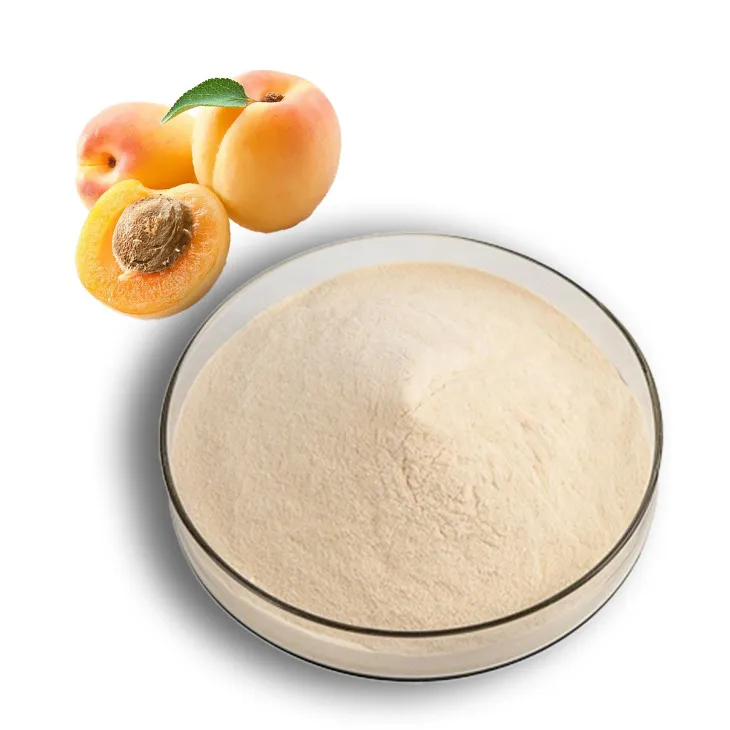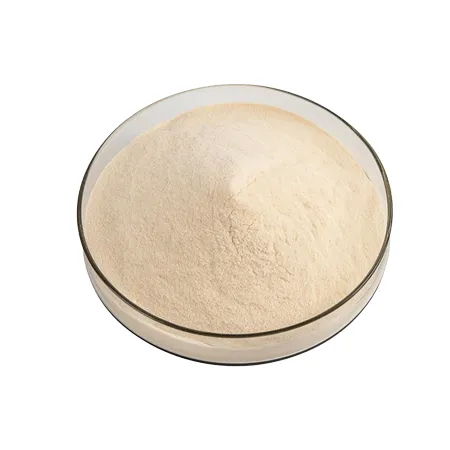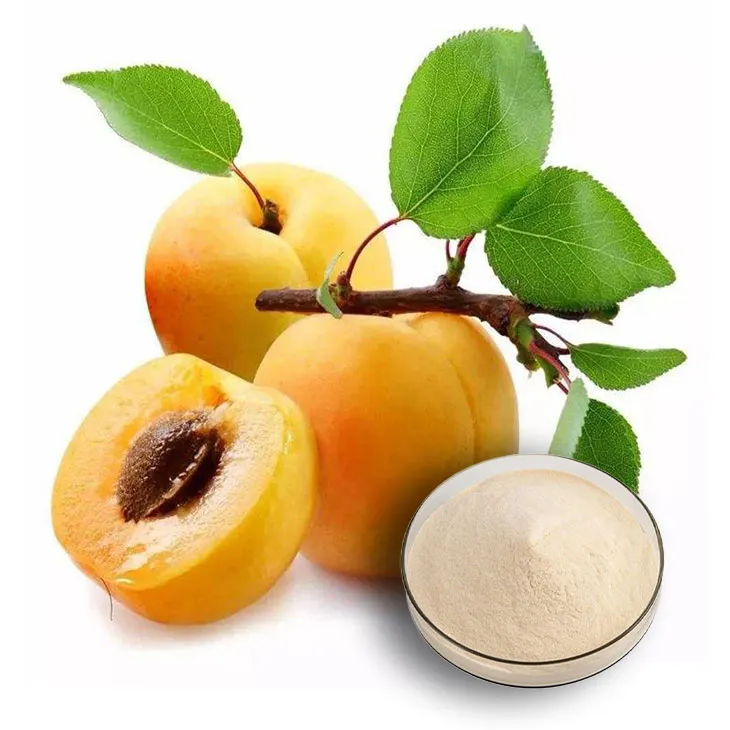- 0086-571-85302990
- sales@greenskybio.com
What is apricot powder? Definition, types, history and nutritional value.
2024-12-12

1. Definition
Apricot Powder is a finely ground product that is made from apricots. It is a concentrated form of apricots, which can be used in a variety of ways. The process of making Apricot Powder involves drying apricots and then grinding them into a fine powder. This powder can retain many of the characteristics of the original apricot, such as its flavor, color, and some of its nutritional properties.

2. Types
2.1 Raw Apricot Powder
Raw apricot powder is made from apricots that have not been subjected to significant processing other than drying and grinding. This type of apricot powder retains more of the original apricot's natural properties. It contains a higher amount of natural enzymes, vitamins, and minerals in their original form. For example, it may have more of the vitamin C that is present in fresh apricots. Raw apricot powder can be a great addition to smoothies, yogurt, or used in baking where a more natural and unadulterated apricot flavor is desired.
2.2 Processed Apricot Powder
Processed apricot powder may be treated in various ways to enhance certain qualities. For instance, it may be treated for better solubility. This is especially useful in applications where the apricot powder needs to be dissolved in liquids, such as in making flavored drinks or certain types of sauces. Processed apricot powder may also be modified for a more consistent or improved taste. This could involve adding small amounts of natural or artificial flavor enhancers. In some cases, it may be fortified with additional nutrients to increase its nutritional value, although this is less common compared to other processed food products.

3. History
The history of apricot powder is closely tied to the long - standing relationship between humans and apricots. Apricots themselves have a rich history, originating from regions in Asia, particularly China. They were introduced to other parts of the world through trade and exploration.
As early as ancient times, people were constantly looking for ways to preserve the bounty of the harvest. Drying fruits was one of the earliest methods of preservation. Apricots, with their relatively high sugar content, were well - suited for drying. Once dried, apricots could be stored for longer periods and were more easily transported.
Over time, as culinary practices evolved, the idea of grinding dried apricots into a powder emerged. In traditional medicine systems in Asia, apricots were believed to have certain health - promoting properties. The powdered form of apricots made it easier to incorporate them into various remedies and tonics. In the kitchens of different cultures, apricot powder began to be used in cooking and baking, adding a unique flavor and color to dishes. It was also used in making confections, as it could provide a concentrated apricot flavor without the need for large amounts of fresh or dried apricots.
With the advent of modern food processing techniques, the production of apricot powder became more standardized and efficient. Today, apricot powder is available not only in local markets in apricot - growing regions but also globally, being used in a wide range of food products, from high - end gourmet cooking to mass - produced snacks and beverages.

4. Nutritional Value
Apricot powder offers a number of important nutritional benefits.
4.1 Carbohydrates: A Source of Energy
One of the main components of apricot powder is carbohydrates. Carbohydrates are the body's primary source of energy. In apricot powder, the carbohydrates are in the form of sugars and starches. The sugars in apricot powder, such as fructose, provide a quick source of energy. This makes apricot powder a great addition to pre - workout snacks or for those who need a quick energy boost during the day. Starches, on the other hand, are broken down more slowly, providing a more sustained release of energy.
4.2 Micronutrients
Apricot powder is also rich in various micronutrients.
- Vitamins: It contains vitamins such as vitamin A, which is important for vision, immune function, and skin health. Vitamin C, although in somewhat reduced amounts compared to fresh apricots, still contributes to antioxidant protection and collagen synthesis. Vitamin E, another antioxidant vitamin, is also present in apricot powder, helping to protect cells from oxidative damage.
- Minerals: Minerals like potassium are found in apricot powder. Potassium is essential for maintaining proper heart function, regulating blood pressure, and ensuring normal muscle contractions. Additionally, apricot powder may contain small amounts of calcium, magnesium, and iron, which are important for bone health, enzyme function, and oxygen transport in the body respectively.
4.3 Flavonoids and Health - Promoting Effects
The presence of flavonoids in apricot powder is another significant aspect of its nutritional value. Flavonoids are a type of phytonutrient with antioxidant properties. They can help to reduce inflammation in the body, which is associated with many chronic diseases such as heart disease, diabetes, and arthritis.
Some studies suggest that the flavonoids in apricot powder may also have potential anti - cancer effects, although more research is needed in this area. These flavonoids can interact with the body's cells in ways that may help to prevent the initiation and progression of cancer cells. Additionally, they may contribute to better cardiovascular health by improving blood vessel function and reducing cholesterol levels.
5. Uses in Culinary
Apricot powder has a wide range of uses in the culinary world.
5.1 Baking
In baking, apricot powder can be used to add flavor and color to a variety of baked goods. For example, it can be added to cakes, muffins, and cookies. It can replace some of the flour in a recipe to create a more unique texture, or it can be used in combination with other dried fruits or nuts to make a more complex flavor profile. When added to bread dough, it can give the bread a subtle apricot aroma and a slightly sweet taste.
5.2 Beverages
Apricot powder is a great addition to beverages. It can be used to make apricot - flavored smoothies, either on its own or in combination with other fruits and ingredients such as yogurt, milk, or protein powder. In hot beverages, it can be added to tea or coffee to create an apricot - scented drink. It can also be used to make apricot - flavored syrups for use in cocktails or mocktails.
5.3 Desserts
When it comes to desserts, apricot powder can be used in making ice creams, sorbets, and puddings. It can add a distinct apricot flavor without the need for large chunks of apricot, which can sometimes disrupt the smooth texture of these desserts. In custards and creams, apricot powder can be blended in to give a unique flavor and a hint of natural color.
5.4 Sauces and Glazes
Apricot powder can be used to make delicious sauces and glazes. For example, it can be combined with vinegar, honey, and spices to make a tangy and sweet apricot glaze for meats such as pork or chicken. In a sauce for desserts or pancakes, it can provide a rich apricot flavor and a slightly thickening effect due to its starch content.
6. Conclusion
Apricot powder is a versatile and nutritious product that has a long history and a wide range of uses. Whether in the kitchen for creating delicious dishes or as a potential source of health benefits, apricot powder has much to offer. As our understanding of food and nutrition continues to grow, apricot powder may find even more applications in the future, both in the culinary and health - related fields.
FAQ:
How is raw apricot powder different from processed apricot powder?
Raw apricot powder retains more of the original apricot's natural properties. Processed apricot powder, on the other hand, may be treated in ways such as to improve its solubility or enhance its taste.
What are the main uses of apricot powder?
Apricot powder can be used in cooking, for example, in baking to add flavor. It can also be used in making beverages, like smoothies. Additionally, it can be a convenient way to incorporate apricot - related nutrition into various food products.
Can apricot powder be used as a substitute for fresh apricots?
While apricot powder can provide some of the nutritional value and flavor of fresh apricots, it is not a complete substitute. Fresh apricots have a higher water content and a different texture. However, apricot powder can be used when fresh apricots are not available or for specific applications like in dry mixes.
How is apricot powder made?
First, apricots are selected. Then, for raw apricot powder, they may be simply dried and ground into a fine powder. For processed apricot powder, there may be additional steps such as treating with certain substances to improve solubility or adding sweeteners or other flavor enhancers before grinding.
What are the health benefits of the flavonoids in apricot powder?
The flavonoids in apricot powder may have antioxidant properties, which can help protect cells from damage. They may also have anti - inflammatory effects and potentially contribute to overall heart health and a reduced risk of certain chronic diseases.
Related literature
- Apricot: Composition, Nutritional Value, and Health Benefits"
- "The History and Modern Uses of Apricot - Based Products"
- ▶ Hesperidin
- ▶ citrus bioflavonoids
- ▶ plant extract
- ▶ lycopene
- ▶ Diosmin
- ▶ Grape seed extract
- ▶ Sea buckthorn Juice Powder
- ▶ Beetroot powder
- ▶ Hops Extract
- ▶ Artichoke Extract
- ▶ Reishi mushroom extract
- ▶ Astaxanthin
- ▶ Green Tea Extract
- ▶ Curcumin Extract
- ▶ Horse Chestnut Extract
- ▶ Other Problems
- ▶ Boswellia Serrata Extract
- ▶ Resveratrol Extract
- ▶ Marigold Extract
- ▶ Grape Leaf Extract
- ▶ blog3
- ▶ blog4
- ▶ blog5
-
Pure 85% Tomentil Extract.
2024-12-12
-
Citrus Aurantii Extract
2024-12-12
-
Golden Seal Extract
2024-12-12
-
Artichoke Leaf Extract
2024-12-12
-
melatonin extract
2024-12-12
-
Cactus Extract
2024-12-12
-
Withania Somnifera Extract
2024-12-12
-
Acerola Extract
2024-12-12
-
Lavender Extract
2024-12-12
-
Selenium yeast
2024-12-12
-
Calendula Extract
2024-12-12





















